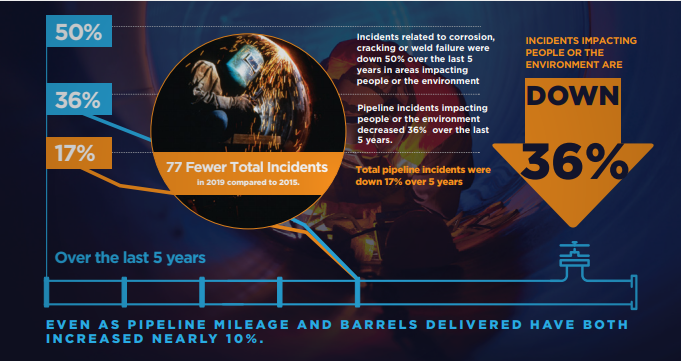API/AOPL Report Finds Strong Pipeline Safety Record
The American Petroleum Institute (API) and Association of Oil Pipe Lines (AOPL) this week released their 2020-2022 Strategic Plan and performance report, finding pipeline safety continues to improve, as total incidents dropped by 17% over the past five years. The report also included several additional positive findings, including but not limited to:
- Pipeline incidents impacting people or the environment decreased 36% over the last 5 years.
- Incidents related to the pipeline itself, such as corrosion, cracking or weld failure, were down 50% over the last 5 years in areas impacting people or the environment.
- Incidents related to installing and maintaining pipeline equipment or operating the pipeline and its valves or pumps were down 13% over the last 5 years in areas impacting people or the environment.
- In 2019, 77% of incidents from liquids pipelines were contained within an operator’s property.

GAIN released a statement today in support of the report’s findings:
“The positive results from the API/AOPL report affirm our nation’s growing pipeline network is the safest, most efficient, and most environmentally-conscious method of delivering the natural gas and oil that American consumers rely on each and every day. Even as pipeline mileage increased and domestic energy production reached record levels, the total number of incidents significantly decreased thanks to the commitment and ingenuity from the industry. Pipeline operators continue to go above and beyond required safety standards to meet our nation’s energy needs – not only increasing reliable, safe access to American energy, but also bolstering our national and energy security at a time when we need it most.”
Compared to the alternatives or truck and rail, pipelines remain the safest and most efficient method of transport. The U.S. Department of Transportation’s Pipeline and Hazardous Materials Safety Administration (PHMSA) concludes that pipelines “enable the safe movement of extraordinary quantities of energy products to industry and consumers, literally fueling our economy and way of life.” PHMSA also says pipelines are “one of the safest and least costly ways to transport energy products.” Further, PHMSA says pipelines alleviate the need for other, less safe means of transportation:
“It would take a constant line of tanker trucks, about 750 per day, loading up and moving out every two minutes, 24 hours a day, seven days a week, to move the volume of even a modest pipeline. The railroad-equivalent of this single pipeline would be a train of 225, 28,000 gallon tank cars”
